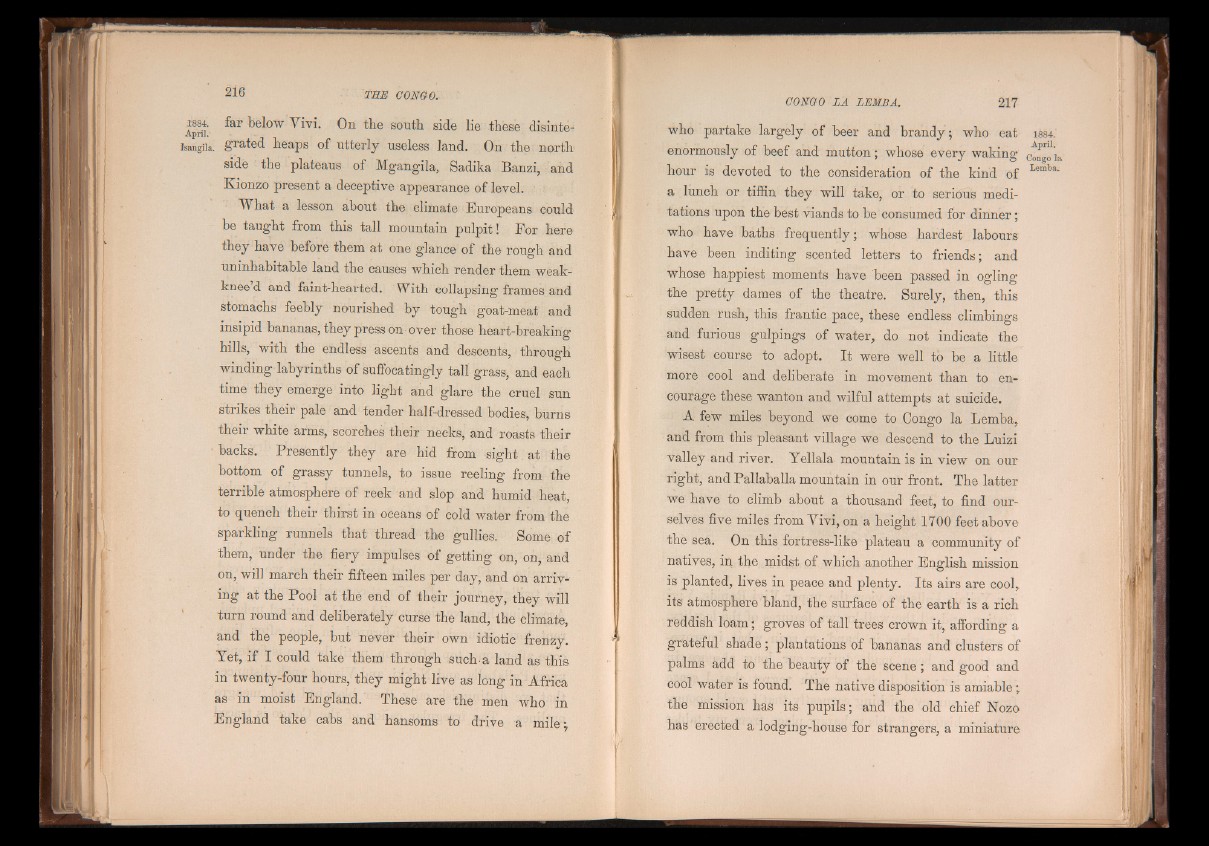
1884. far below Yivi. On the south side lie these disinté- April.-
Isangila. grated heaps of utterly useless land. On the north
side the plateaus of Mgangila, Sadika Banzi, and
Kionzo present a deceptive appearance of level.
What a lesson about the climate Europeans could
be taught from this tall mountain pulpit! For here
they have before them at one glance of the rough and
uninhabitable land the causes which render them weak-
knee d and faint-hearted. With collapsing frames and
stomachs feebly nourished by tough goat-meat and
insipid bananas, they press on over those heart-breaking
hills, with the endless ascents and descents, through
winding labyrinths of suffocatingly tall grass, and each
time they emerge into light and glare the cruel sun
strikes their pale and tender half-dressed bodies, burns
their white arms, scorches their necks, and roasts their
backs. Presently they are hid from sight at the
bottom of grassy tunnels, to issue reeling from the
terrible atmosphere of reek and slop and humid heat,
to quench their thirst in oceans of cold water from the
sparkling runnels that thread the gullies. Some of
them, under the fiery impulses of getting on, on, and
on, will march their fifteen miles per day, and on arriv-
ing at the Pool at the end of their journey, they will
turn round and deliberately curse the land, the climate,
and the people, but never their own idiotic frenzy.
Yet, if I could take them through such-a land as this
in twenty-four hours, they might live as long in Africa
as in moist England. These are the men who in
England take cabs and hansoms to drive a mile -,
GONGO LA LEMBA. 217
who partake largely of beer and brandy; who eat
enormously of beef and mutton; whose every waking
hour is devoted to the consideration of the kind of
a lunch or tiffin they will take, or to serious meditations
upon the best viands to be consumed for dinner;
who have baths frequently; whose hardest labours
have been inditing scented letters to friends; and
whose happiest moments have been passed in ogling
the pretty dames of the theatre. Surely, then, this
sudden rush, this frantic pace, these endless climbings
and furious gulpings of water, do not indicate the
wisest course to adopt. I t were well to be a little
more cool and deliberate in movement than to encourage
these wanton and wilful attempts at suicide.
A few miles beyond we come to Congo la Lemba,
and from this pleasant village we descend to the Luizi
valley and river. Yellala mountain is in view on our
right, and Pallaballa mountain in our front. The latter
we have to climb about a thousand feet, to find ourselves
five miles from Yivi, on a height 1700 feet above
the sea. On this fortress-like plateau a community of
natives, in the midst of which another English mission
is planted, lives in peace and plenty. Its airs are cool,
its atmosphere bland, the surface of the earth is a rich
reddish loam; groves of tall trees crown it, affording a
grateful shade ; plantations of bananas and clusters of
palms add t.0 the beauty of the scene ; and good and
cool water is found. The native disposition is amiable;
the mission has its pupils; and the old chief Nozo
has erected a lodging-house for strangers, a miniature
Congo la
Lemba.